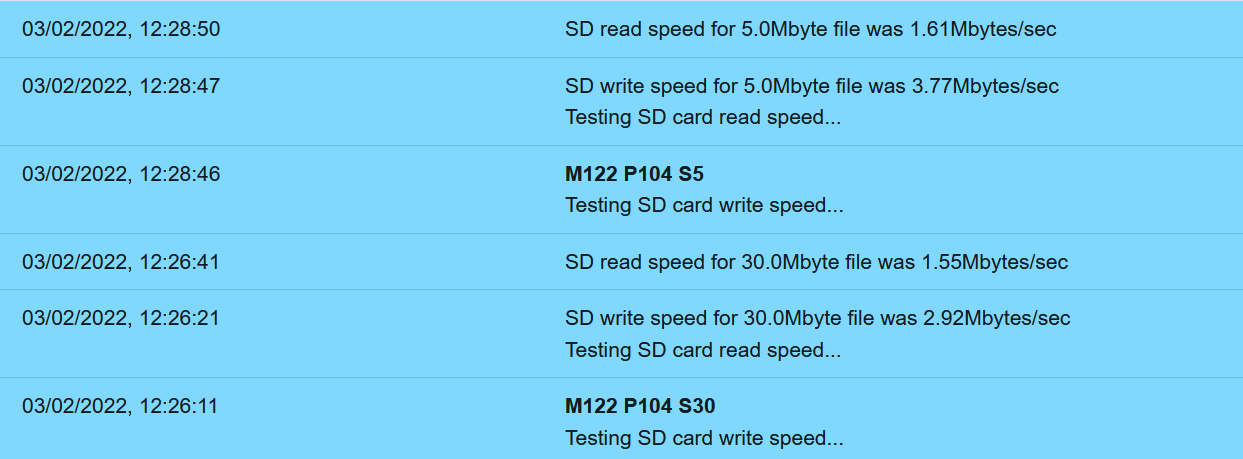@phaedrux @dc42 @gloomyandy
I believe I found the Issue - small volume size lead to massive fragementation resulting in horrible SD-card performance.
In preparation for the "new cards" I took out the stock card and found out that the 8 GB card only has a 256 MB partition (so only 256 MB were usable).
Being curious I reformatted the card to it's full capacity and ran the Speed tests M122 P104 again, surprise, surprise speed tests dramatically improved:
with 256 MB partition (mostlikely massivly fragmented):

with 8GB partition:

Read speed nearly trippled!
Trying it again and BAM issue solved! - With the very same SD-Card!!!!

My assumptions and maybe what might cause this:
- with 256 MB the "volume" is pretty full as my gcode+firmware files already occupied ~200 MB so not a lot of "free space"
- doing a several firmware updates and lots of configuration changes, deleting and uploading always performs writes to the SD-card
- FAT32 tends to fragment much more than other more modern filesystems
- SD-card interface of Duet is not comparable with a high-tech PCIe SSD.
Bottom line the small volume got highly fragmented (explanation see below), resulting in super bad performance.
Unfortunatly I did not check the SD-card for fragmentation prior deleting, so I have no "proof".
Suggestion for Duet
I assume the small volume size of 256 GB is a result of historic artifact, because that allows to use any size of SD-card (down to 256 MB) in the production process. My humble suggestion would be
- to change the manufacturing process to either start with lager volumes (e.g. 4 GB or 8 GB) or to make this a dynamic process, automatically sizing the partition/volume to the maximum available space (maybe add a cap at 32 GB to take FAT32 limit into account).
- for existing customers and new customers receiving such cards, I'd put a clear Note about this topic in the documentation (something like "Consider reformating your SD-card to maximum capacity).
*Fragmentation explained by Roland (music instruments) -
When an SD card recorder stores new files, it squeezes them into any bits of space it can find. As a result, the data winds up scattered all over the hard drive. When the data from one song file, for example, is stored in many locations within the card memory, the card is said to be fragmented. When the recorder plays back a file from a fragmented card, it has to grab a little piece from here, another piece from there and so on. This is much harder than playing one continuous chunk of data from a single card location. This can slow things down unacceptably and lead to errors during playback, recording and/or any other function in the recorder.
Fragmentation is a naturally occurring process for a card used with any computer or recording device. SD cards that record audio are especially prone to fragmentation due to the start-and-stop nature of recording.
We recommend backing up all of your data and then initializing the SD card to clear out this normal fragmentation. To avoid receiving errors and/or problems, initialize the card a couple of times a year.. The following steps will guide you through the Card Backup, Card Initialize and Card Recover procedures:*



 as soon as the boars starts working again )
as soon as the boars starts working again )


